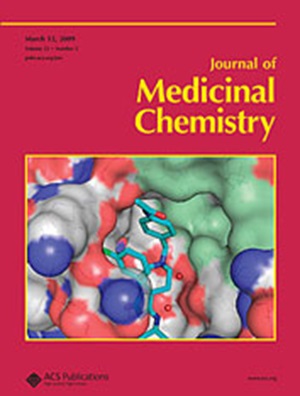Expanding the Chemistry of Acyl Diazo Electrophile as a Tunable Warhead for Covalent Targeting of KRAS (G12D) Mutant.
IF 6.8
1区 医学
Q1 CHEMISTRY, MEDICINAL
引用次数: 0
Abstract
Covalent warheads are indispensable in the design and development of targeted covalent inhibitors (TCIs). Here, we designed and evaluated acyl diazo probes as an aspartic acid/glutamic acid targeted warhead. Among these probes, P1 demonstrated chemoselectivity for carboxyl residues, even under complex physiological conditions, effectively modifying the proteome in both cell lysates and live cells. Subsequently, we incorporated the warhead onto MRTX-1133, a potent ligand of the KRAS (G12D) mutant, to generate a novel TCI called KN2-H. Compared with other mutants, KN2-H demonstrated covalent modification specifically targeting the KRAS (G12D) mutant, with notable chemoselectivity. It also possessed strong antiproliferative activity against KRAS (G12D) mutant cell lines by downregulating RAS oncogenic signaling. Our findings provide a novel strategy for designing novel TCIs targeting carboxyl residues, based on acyl diazo warheads.扩展酰基重氮亲电试剂作为KRAS (G12D)突变体共价靶向可调战斗部的化学性质。
在靶向共价抑制剂(tci)的设计和开发中,共价战斗部是必不可少的。在这里,我们设计并评估了酰基重氮探针作为天冬氨酸/谷氨酸靶向弹头。在这些探针中,P1显示出对羧基残基的化学选择性,即使在复杂的生理条件下,也能有效地修饰细胞裂解物和活细胞中的蛋白质组。随后,我们将战斗部结合到KRAS (G12D)突变体的有效配体MRTX-1133上,以生成称为KN2-H的新型TCI。与其他突变体相比,KN2-H表现出特异性针对KRAS (G12D)突变体的共价修饰,具有显著的化学选择性。通过下调RAS致癌信号通路,对KRAS (G12D)突变细胞株具有较强的抗增殖活性。我们的发现为基于酰基重氮弹头设计针对羧基残基的新型tci提供了一种新的策略。
本文章由计算机程序翻译,如有差异,请以英文原文为准。
求助全文
约1分钟内获得全文
求助全文
来源期刊

Journal of Medicinal Chemistry
医学-医药化学
CiteScore
4.00
自引率
11.00%
发文量
804
审稿时长
1.9 months
期刊介绍:
The Journal of Medicinal Chemistry is a prestigious biweekly peer-reviewed publication that focuses on the multifaceted field of medicinal chemistry. Since its inception in 1959 as the Journal of Medicinal and Pharmaceutical Chemistry, it has evolved to become a cornerstone in the dissemination of research findings related to the design, synthesis, and development of therapeutic agents.
The Journal of Medicinal Chemistry is recognized for its significant impact in the scientific community, as evidenced by its 2022 impact factor of 7.3. This metric reflects the journal's influence and the importance of its content in shaping the future of drug discovery and development. The journal serves as a vital resource for chemists, pharmacologists, and other researchers interested in the molecular mechanisms of drug action and the optimization of therapeutic compounds.
 求助内容:
求助内容: 应助结果提醒方式:
应助结果提醒方式:


